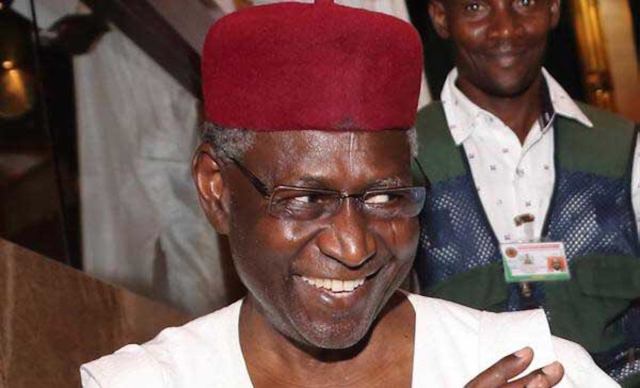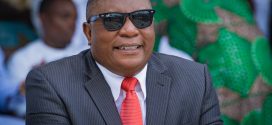There is a saying in the Yoruba tradition to the effect that death translates ordinary mortals into idols. I do not know the exact sense in which progenitors of the tradition meant it, but this can be construed in two ways, at least.
The first but more improbable is the spiritual. In Yoruba cosmology, the dead are believed to have moved on into the spirit realm albeit with the capacity to still fight on behalf of their descendants. The second sense, which is the most likely and relevant to this intervention is that the good that people do in their lifetime is generally most apparent after their passage.
Again, this proposition may be hinged on one of two planks. The first could emanate from the belief that you should not speak evil of the dead. And that is understandable. Not only is a dead man now a spirit and possibly in the league of ancestors, he is also dead and gone, in no place to defend himself. So, why flog a dead horse? That would not just be a futile effort; it would be inhuman!
The second plank on which this point could rest is that the world does not generally speak about the import of the lives of people until they are no longer there. So, at the death of a person, those who know them are effusive about their good deeds some of which may have never been spoken. Tradition however forbids evil from being spoken about them even when there are testimonies that impeach the abundance of posthumous positive revelations.
So, Nigerians woke up on Saturday morning to the news of the death of Mallam Abba Kyari, until then the Chief of Staff to the President, Major General Muhammadu Buhari (retd.). Kyari was in a no love lost relationship with most Nigerians who, for no fault of theirs, saw him as Nigeria’s alternate President. And there are so many reasons you should not blame Nigerians for seeing Kyari as not just a usurper but the one behind everything that may not be working in the Buhari regime.
One of these is that some of the people who should know, given their proximity to the powerhouse, told Nigerians so. Recall that just about one year into the first term of the Buhari regime, former Senate President Bukola Saraki suggested that an unnamed cabal might have edged Buhari out of executive control.
In reaction to the barrage of court cases that he faced shortly after his inauguration, Saraki said the following in a statement he personally signed: “However, what has become clear is that there is now a government within the government of President Buhari who have seized the apparatus of Executive powers to pursue their nefarious agenda.” Although he did not mention names, Saraki, then number three in the hierarchy of leadership, should know.
Then, the wife of the President, Aisha, herself spoke repeatedly about the hijack of her husband’s regime. Her first outburst came just about three months after Saraki alleged that Buhari was not in control. Speaking in an interview with the British Broadcasting Corporation, Aisha said: “…even though I cannot lay claim that I brought about the government, it is the mass revolt… Then, some unknown people were brought in to lead the people. These people were not even around during our campaigns… But today, some of them are boasting that they are not politicians, even though they are occupying seats meant for politicians…These people I’m complaining about are not more than two or three…” Of course, the First Lady did not mention names but it soon became easy to put a tag on the people she had in mind especially as she never let any opportunity to insist on the subordination of her husband’s authority pass.
That is not to speak of the real and imagined in-fighting within the regime, one or two of which have direct reference to the late chief of staff. A case in point is the leakage of a memo wherein the National Security Adviser, Babagana Monguno, accused Kyari of undue interference on national security matters.
Then, Buhari contributed to the perception of Kyari as an overbearing interloper. While by the nature of his office, the Chief of Staff is literarily the most powerful person in the Presidency (who can justifiably hide under the pretence of protecting his principal to get anything done and undone), the knowledge and weight of this influence are better restricted within presidency circles. Unfortunately, Buhari buoyed the larger-than-life image of his late chief of staff.
At a retreat for newly appointed ministers last August, Buhari had publicly directed all members of the federal cabinet to channel requests for communication and meetings with him through Kyari. Even though this is trite, given the fact that the Chief of Staff, in fact, determines those who meet the President and when, the indiscretion of reiterating the fact at that occasion accentuated the impression Nigerians already had. It opened Kyari and his principal to opprobrium. Buhari removed the veil on the office of the chief of staff, gave him a public face, sent him on assignments, ordinarily meant for cabinet ministers without minding the growing narrative about Kyari’s influence.
The greatest disservice to the Kyari legacy however remains the refusal and failure of the man to speak for or defend himself on any of the many allegations levelled against him, especially as the regime he served, never came to his defence. Reading my brother and friend Simon Kolawole’s piece, Now that Abba Kyari is dead, it occurred to me that Kyari had done great injustice to himself and all of us for not speaking up when he should have.
On the trail of Kolawole’s piece were other interventions from other people who knew the former chief of staff closely. From Foreign Affairs Minister, Geoffrey Onyeama to former Aviation Minister, Femi Fani-Kayode and Publisher of LEADERSHIP, Sam Nda-Isaiah, you could have an anthology of the misunderstood man that Kyari was. Although all of these people were close to him and may be exhibiting varying measures of subjectivity, Nigerians should also be mindful of the ancient philosophy that there is no bad man that is not good and no good man that is not bad.
The perception of Kyari as a man with an insatiable power appetite who had the President of the Federal Republic in a closet is a great contradiction if not disservice to the image he created in his about four decades in the corporate world. And it is a tragedy that his entire career summed up in the mere five years of his power relations.
What is most painful is that Kyari neither spoke nor allowed friends who had the capacity to ventilate the other side of the story. His reason, said to be the assurance of the confidence of his principal as valid as it could be, has proved to be terribly shortsighted.
If life is a raw material for history, a former newspaper editor and managing director of a leading commercial bank should know that even though he served at the pleasure of the President, they both worked for a country and that this service would be held to scrutiny one day.
Kyari having lived in Nigeria’s political forest undefended by the government he served and maligned by those privy to the intellectual might he was said to have brought on contemporary political development, should have had his mind on history. History, not just for the sake of his children who may bear the burden of perceptions the people hold of their father, but also for a country which has been denied the lessons of the truth of it all.
Perhaps, Kyari hoped to share his story one day but death has put an untimely end to that prospect. That is a tragedy that everyone in public service and everyone sitting on the edges of history should avoid. When lies are told with tenacity, they gain veracity and may become your truth. Gone were the days when people did not speak evil against the dead, especially the dead, who did not speak their own truth.
May the departed find rest. May the living learn
 Hottestgistnaija.com
Hottestgistnaija.com





